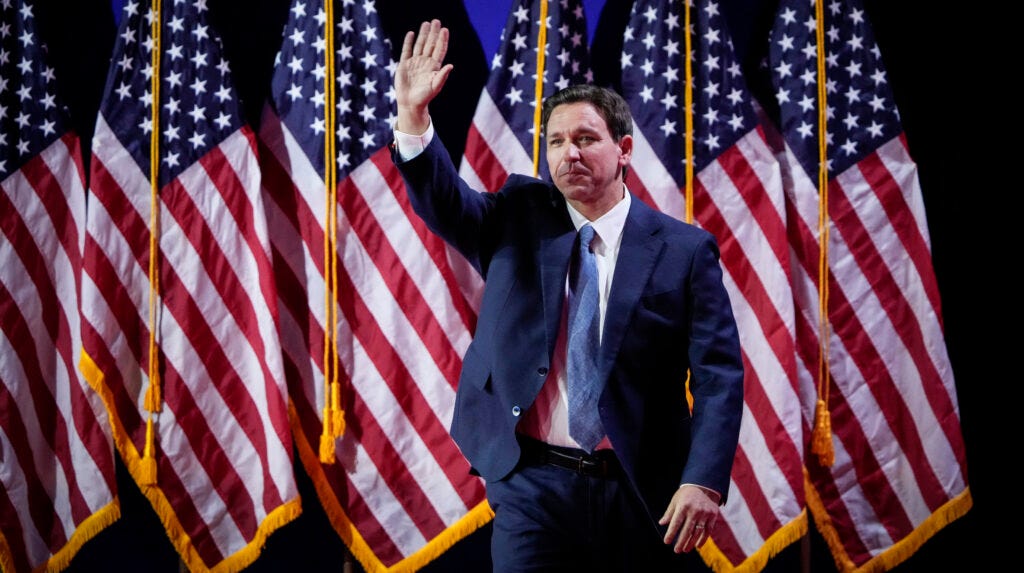Ron DeSantis Was The Last Hope Of A Covid Reckoning
Hi readers,
I’m sharing here my new UnHerd piece on Governor DeSantis and his Covid legacy. I hope it helps advance our corrupted political and public health discourse. Happy Friday!
— Jay
Ron DeSantis was the last hope of a Covid reckoning
I first spoke with Ron DeSantis, who yesterday dropped out of the US presidential race, when he cold-called me on a Sunday afternoon in September 2020. An unidentified number showed up on my phone from Florida, and one of his aides then asked if I would be willing to speak with the Governor. We spoke for over two hours: on Covid-19 risk factors, on immunity, on the harms of lockdowns, and on the safety of opening schools. I came away from that conversation impressed by DeSantis’s command of the scientific literature: though not a scientist, he could cogently discuss the footnotes.
The next day, the Governor invited me to a policy roundtable where he led a public discussion on Covid policy between me and fellow academics: the Nobel Prize-winning Stanford scientist Michael Levitt and the Harvard epidemiologist Martin Kulldorff. DeSantis then announced that he was lifting all remaining lockdown policies in Florida and would not institute them again. The following year he granted me an interview, in which he described the pressure to lock down Florida in March 2020 by figures such as White House Covid Task Force Coordinator Deborah Birx. The Governor expressed regret —an act remarkably rare for politicians — at agreeing to close the state in the first place, and vowed to put in place reforms which would make lockdowns a thing of the past.
In autumn 2020, as California Governor Gavin Newsom kept pupils out of school, DeSantis ordered an in-person option for every child in Florida. Following the lack of high-quality randomised evidence suggesting community masking can effectively prevent Covid, DeSantis prohibited mask mandates in the state.
In late 2020, when vaccines first became available, following evidence that older people were more than a thousand times more likely than teenagers to die from Covid infection and that the vaccine could reduce that risk, the Governor prioritised older people for vaccination. He did this at a time when public health authorities waffled on the topic, wondering whether to prioritise minorities and young healthcare workers instead.
In 2021, following evidence that vaccination did not prevent Covid transmission and so did not provide a public benefit to others besides the recipient, DeSantis rejected the coercive idea of vaccine mandates and passports. At a time when hospitals were preventing families from visiting with dying relatives, he enacted a humanitarian law guaranteeing visitation rights.
What was the result of these policies? Since the beginning of the pandemic, Florida has had lower all-cause excess deaths, after adjusting for its older population, than California. DeSantis’s state protected human life better than locked-down California did, and it had better economic outcomes, including far lower unemployment and better educational outcomes for its school kids.
One reason for the Republican reluctance to revisit the Covid era might be that many voters feel conflicted over their early support for lockdowns. They are thus loath to give DeSantis sufficient credit for his pandemic accomplishments. In this reading Trump, savvy operator that he is, has not proposed any honest evaluation of his Covid policies to avoid picking a scab that might make him — and much of the Republican electorate — look bad.
It seems altogether unlikely that the US will have an honest inquiry into the Covid policy disaster. One can simply compare the low all-cause excess deaths that Sweden achieved without lockdowns against the shockingly high excess deaths in the United States to see the need for one. Unfortunately, the US cannot look to the UK for a good example given the whitewash which took place at the latter’s Covid inquiry. That was led by people who seem to sincerely believe, despite overwhelming evidence to the contrary, that the disease would have disappeared had Boris Johnson imposed a Chinese-style lockdown in February 2020.
There are two distinct and contradictory visions of the future now that DeSantis is gone from the presidential race. According to the pessimistic one, the lesson of DeSantis losing the Republican primary race is that Americans will never have an honest inquiry over the Covid policy fiasco. The more optimistic reading is that there may be one, but only if we can muster the grace to have it focus on providing lessons for future policy and not on political point-scoring. I’ll keep working towards the latter vision. But if it is the former, then lockdowns are a permanent fixture in the public health toolbox, and the population should plan accordingly for them to inevitably return.



No comments:
Post a Comment